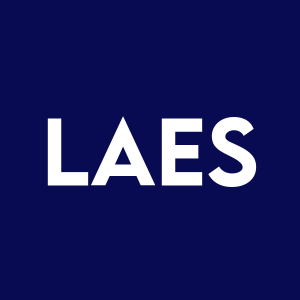SEALSQ and the Seoul Metropolitan Government Sign MoU to Establish a Post-Quantum Semiconductor Personalization, Research and Design Center in Seoul
Rhea-AI Summary
SEALSQ (NASDAQ: LAES) has signed a Memorandum of Understanding (MoU) with the Seoul Metropolitan Government to establish a Post-Quantum Semiconductor Personalization, Research and Design Center in Seoul. The state-of-the-art facility will focus on researching, designing, and embedding quantum-resistant cryptographic keys into semiconductor chips.
The initiative aligns with South Korea's dominant position in the global semiconductor market, controlling 17% of worldwide semiconductor market share. The government has allocated $136 million for quantum R&D in 2025. The global Post-Quantum Cryptography (PQC) market is projected to grow from $1.1 billion in 2024 to $4-9 billion by 2030-2033, with a CAGR of 37-45%.
The center will leverage RISC-V chip architectures with embedded post-quantum cryptography and integrate quantum-resistant encryption modules into satellite systems, positioning South Korea as a leader in both semiconductor and space innovation sectors.
Positive
- Strategic partnership with Seoul Metropolitan Government strengthens SEALSQ's global expansion
- Access to South Korea's dominant semiconductor market with 17% global market share
- Alignment with government's $136 million quantum R&D investment in 2025
- Targeting fast-growing PQC market projected to reach $4-9 billion by 2030-2033
- Integration of quantum-resistant technology into satellite systems expands market opportunities
Negative
- Project is still in early MoU stage with locations and partners yet to be identified
- Significant investment and infrastructure required for implementation
- Competitive pressure in South Korea's established semiconductor market
News Market Reaction – LAES
On the day this news was published, LAES declined 1.86%, reflecting a mild negative market reaction. Argus tracked a peak move of +7.1% during that session. Argus tracked a trough of -13.1% from its starting point during tracking. Our momentum scanner triggered 53 alerts that day, indicating high trading interest and price volatility. This price movement removed approximately $13M from the company's valuation, bringing the market cap to $664M at that time. Trading volume was elevated at 2.6x the daily average, suggesting increased selling activity.
Data tracked by StockTitan Argus on the day of publication.
Seoul, South Korea / Geneva, Switzerland, Sept. 22, 2025 (GLOBE NEWSWIRE) --

SEALSQ Corp (NASDAQ: LAES) ("SEALSQ" or "Company"), a company that focuses on developing and selling Semiconductors, PKI, and Post-Quantum technology hardware and software products, today announced the signing of a Memorandum of Understanding (MoU) with the Seoul Metropolitan Government and Invest Seoul, represented by Mayor Oh Se-hoon, which aims to establish a Post-Quantum Semiconductor Personalization, Research and Design Center in Seoul. The parties will now work together to identify suitable locations and local partners to join this exciting project.
A Quantum-Ready Facility for the Next Generation of Security
The proposed new center would serve as a state-of-the-art facility dedicated to researching, designing, testing, and embedding quantum-resistant cryptographic keys and identities into semiconductor chips, a crucial final step in the value chain that ensures devices are secured against future quantum-enabled cyberattacks.
The facility would serve to:
- Research and design innovative RISC-V chip architectures integrated with post-quantum cryptography
- Personalize and test post-quantum cryptographic chips at scale for IOT applications.
- Integrate quantum-resistant encryption modules into satellite systems, enhancing secure space communications.
- Act as a regional hub for semiconductor and space innovation, strengthening South Korea’s leadership in both industries.
The project plans to leverage RISC-V–based chip architectures with embedded post-quantum cryptography, fully compliant with Common Criteria and NIST’s Post-Quantum Cryptography (PQC) guidelines.
Strategic Alignment with South Korea’s Semiconductor & Space Leadership
South Korea is a global semiconductor powerhouse, controlling nearly
The establishment of this center aims to directly address the growing market demand for PQC:
- The global PQC market is projected to grow from
$1.1 billion in 2024 to between$4 –9 billion by 2030–2033, representing a CAGR of 37–45% . - The Asia-Pacific region is among the fastest-growing markets, with South Korea leading as a testbed for quantum key distribution (QKD), PQC pilots, and secure communications infrastructure.
By combining semiconductor expertise with quantum-ready cryptography, the new center would strengthen South Korea’s strategic role in global cybersecurity and digital sovereignty.
A unique feature of the Seoul initiative is the proposed integration of quantum-resistant technology into satellite systems, reflecting a forward-thinking approach to securing global communications infrastructure. As quantum computing advances, space-based assets such as satellites, navigation systems, and communications networks face heightened vulnerability. By embedding PQC directly at the semiconductor level, SEALSQ is demonstrating a comprehensive approach to post-quantum security, converging terrestrial and space-based infrastructure to ensure resilience in both domains.
A Global Expansion Through Public-Private Partnerships
This project is part of SEALSQ’s broader global expansion strategy through Public-Private Partnerships (PPPs), with similar initiatives currently underway and in development across Europe, the Middle East, and Asia.
The company’s focus on RISC-V chip architectures integrated with post-quantum cryptography ensures alignment with international standards and regulatory frameworks, particularly those emerging from NIST PQC guidelines. This positions SEALSQ at the forefront of compliance, resilience, and trust in the post-quantum era.
“South Korea has long been a semiconductor powerhouse,” said SEALSQ’s Director David Fergusson, who together with SEALSQ’s COO Loic Hamon, signed the MOU with Mayor Oh He-soon at the 2025 Seoul Investors Forum. “Today, the country’s economy runs on semiconductors,which are embedded in every industry, from automotive to telecom to healthcare. Yet, without secure next-generation chips, it will be impossible to sustain the growth of this integrated digital society. By hosting SEALSQ’s Post-Quantum Semiconductor Center in Seoul, the nation is not only strengthening its dominance in chips but also positioning itself as a first mover in post-quantum security, a field that will define global competitiveness in the coming decade. This initiative ensures Korea’s future remains both innovative and secure.”
"Today, Seoul joins hands with SEALSQ, the world’s leading quantum security technology company, to shape the future together,” said Mayor Oh Se-hoon, Seoul Metropolitan Government. “The South Korean government has recently announced plans to pilot applications of quantum security technology in core national infrastructure, including administration, communications, defense, and healthcare. Partnering with SEALSQ on this Post-Quantum Semiconductor Personalization, Research and Design Center reinforces our ambition to lead not only in semiconductors but also in cybersecurity and space innovation. This initiative will help secure our digital future and create high-value opportunities for our economy."
"The signing of this MoU with the City of Seoul marks an important milestone in our mission to build a quantum-safe world,” said Carlos Moreira, Founder and CEO of SEALSQ. “By embedding post-quantum cryptography at the semiconductor level, we are addressing one of the most urgent global challenges: ensuring that critical infrastructure remains secure in the age of quantum computing. Few countries are as uniquely positioned as South Korea to lead this transformation. Throught the SEALSQ program, we are establishing a tryly collaborative partnership, bringing the world’s most innovative post-quantum chip technology to the country in collaboration with the Seoul Metropolitan Government and leading Korean semiconductor companies. Together we aim to unlock the full potential of post-quantul inovation.”
About the Seoul Metropolitan Government
Seoul Metropolitan Government, through its Formal Investment Promotion Agency Invest Seoul, is dedicated to creating a foreign investor–friendly environment and transforming the city into a premier global investment hub. By leveraging expertise and collaborating with industry institutions and private-sector specialists, Seoul supports global enterprises entering the city as well as Seoul-based companies seeking international growth, pledging to be a trusted partner for investors and businesses shaping the future. Visit: english.seoul.go.kr (Seoul Metropolitan Government), investseoul.org (Invest Seoul).
About SEALSQ:
SEALSQ is a leading innovator in Post-Quantum Technology hardware and software solutions. Our technology seamlessly integrates Semiconductors, PKI (Public Key Infrastructure), and Provisioning Services, with a strategic emphasis on developing state-of-the-art Quantum Resistant Cryptography and Semiconductors designed to address the urgent security challenges posed by quantum computing. As quantum computers advance, traditional cryptographic methods like RSA and Elliptic Curve Cryptography (ECC) are increasingly vulnerable.
SEALSQ is pioneering the development of Post-Quantum Semiconductors that provide robust, future-proof protection for sensitive data across a wide range of applications, including Multi-Factor Authentication tokens, Smart Energy, Medical and Healthcare Systems, Defense, IT Network Infrastructure, Automotive, and Industrial Automation and Control Systems. By embedding Post-Quantum Cryptography into our semiconductor solutions, SEALSQ ensures that organizations stay protected against quantum threats. Our products are engineered to safeguard critical systems, enhancing resilience and security across diverse industries.
For more information on our Post-Quantum Semiconductors and security solutions, please visit www.sealsq.com.
Forward-Looking Statements
This communication expressly or implicitly contains certain forward-looking statements concerning SEALSQ Corp and its businesses. Forward-looking statements include statements regarding our business strategy, financial performance, results of operations, market data, events or developments that we expect or anticipate will occur in the future, as well as any other statements which are not historical facts. Although we believe that the expectations reflected in such forward-looking statements are reasonable, no assurance can be given that such expectations will prove to have been correct. These statements involve known and unknown risks and are based upon a number of assumptions and estimates which are inherently subject to significant uncertainties and contingencies, many of which are beyond our control. Actual results may differ materially from those expressed or implied by such forward-looking statements. Important factors that, in our view, could cause actual results to differ materially from those discussed in the forward-looking statements include SEALSQ's ability to continue beneficial transactions with material parties, including a limited number of significant customers; market demand and semiconductor industry conditions; and the risks discussed in SEALSQ's filings with the SEC. Risks and uncertainties are further described in reports filed by SEALSQ with the SEC.
SEALSQ Corp is providing this communication as of this date and does not undertake to update any forward-looking statements contained herein as a result of new information, future events or otherwise.
| SEALSQ Corp. Carlos Moreira Chairman & CEO Tel: +41 22 594 3000 info@sealsq.com | SEALSQ Investor Relations (US) The Equity Group Inc. Lena Cati Tel: +1 212 836-9611 lcati@theequitygroup.com |







